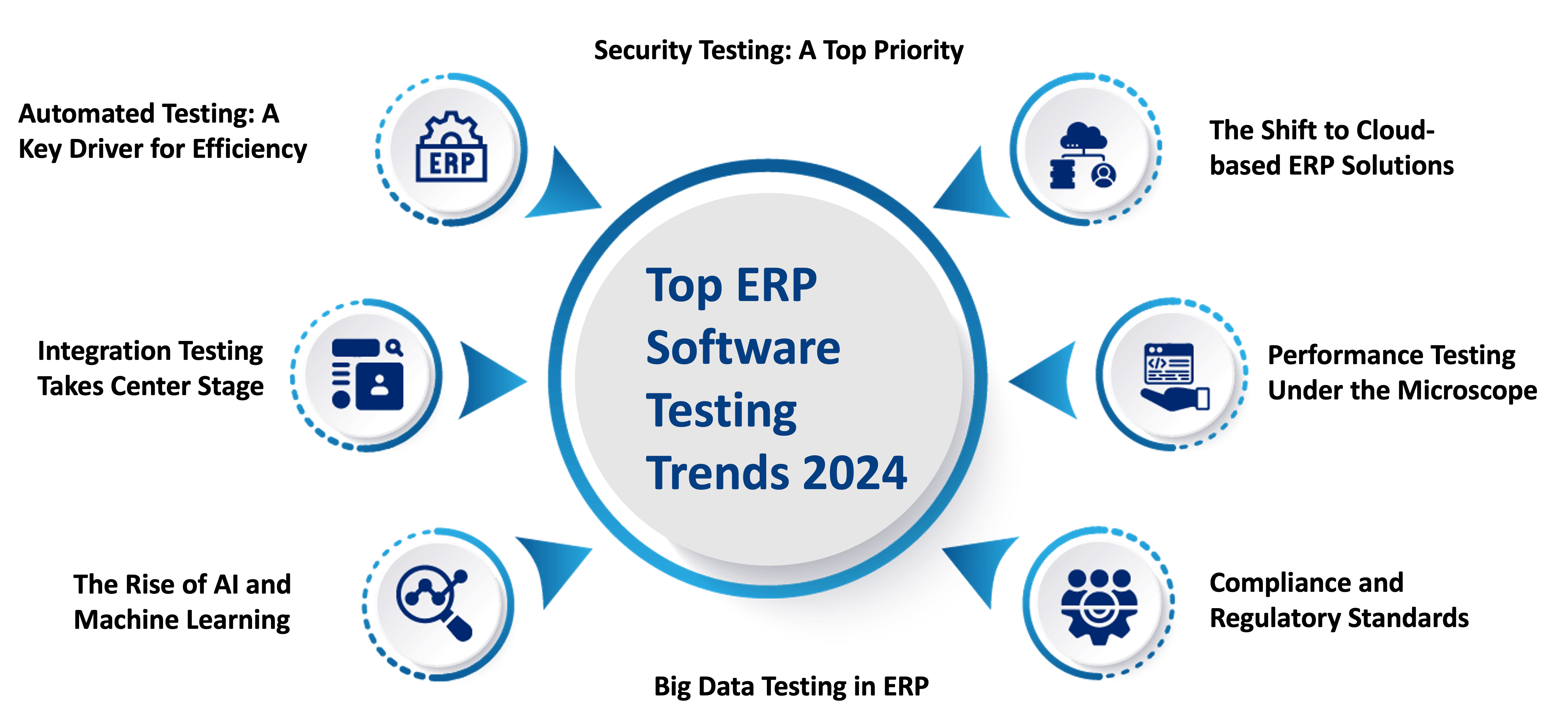The Future of ERP: Emerging Trends in Software Testing in 2024
Release date: 11-2023Author: Market Statsville Group
Release date: 11-2023Author: Market Statsville Group

The Enterprise Resource Planning (ERP) market is continually evolving, shaped by technological advancements, changing business practices, and the constant need for organizations to streamline their operations for better efficiency and competitiveness. As we look towards 2024, several emerging trends in ERP software testing are expected to gain traction, reshaping how businesses approach ERP implementation and maintenance. This blog delves into these trends, providing a comprehensive market analysis for businesses, IT professionals, and stakeholders involved in ERP software testing.
Automated Testing: A Key Driver for Efficiency
Automation has been a buzzword in the software testing market for several years, but its integration into ERP testing is set to become more pronounced in 2024. Automated testing tools can perform repetitive tasks precisely, enabling faster deployment cycles and quicker time-to-market for ERP systems. This shift is also driven by the growing complexity of ERP solutions, which integrate various business processes, requiring extensive coverage that manual testing cannot feasibly provide.
The Rise of AI and Machine Learning
Artificial Intelligence (AI) and Machine Learning (ML) are transforming ERP software testing by enabling predictive analysis, smarter test case generation, and optimization of testing processes. AI algorithms can analyze historical data to predict potential problem areas, helping testers focus their efforts more effectively. In 2024, these technologies will further penetrate the ERP testing market, reducing the time and cost associated with ERP deployments.
Integration Testing Takes Center Stage
As more organizations move towards digital ecosystems, the interconnectivity of ERP systems with other business applications will demand enhanced integration testing. In 2024, testing will not just focus on the ERP system alone but also on how it interfaces with external systems, such as CRM, SCM, and third-party analytics tools. Ensuring seamless data flow and functionality across these touchpoints will be crucial for the overall performance of the business.
The Shift to Cloud-based ERP Solutions
The transition to cloud-based ERP solutions is accelerating, prompting a corresponding change in testing strategies. Cloud ERP offers scalability, cost-effectiveness, and easy access to updates. However, it also introduces challenges around data security, privacy, and regulatory compliance that testers must address. The growth in this sector is expected to boost demand for specialized cloud testing services in 2024.
Performance Testing Under the Microscope
As reliance on ERP systems grows, so does the importance of their performance. Businesses cannot afford downtimes or delays caused by overloaded ERP systems. Performance testing will thus become even more critical in 2024, focusing on stress and load testing to ensure that ERP systems can handle peak loads without faltering.
Security Testing: A Top Priority
With increasing cyber threats and data breaches, security is a paramount concern for ERP systems. In 2024, security testing will involve thorough checks for vulnerabilities, including penetration testing and risk assessments. This focus ensures that sensitive data housed within ERP systems is safeguarded against unauthorized access and exploitation.
Compliance and Regulatory Standards
Adhering to compliance standards like GDPR, HIPAA, and SOX is imperative for ERP systems, especially for industries such as healthcare, finance, and manufacturing. Software testing in 2024 will be expected to place a greater emphasis on regulatory compliance, with tests designed to validate that ERP solutions meet all relevant legal and industry requirements.
Big Data Testing in ERP
Big data is becoming an integral part of ERP solutions, providing valuable insights into business processes. Testing ERP systems for big data capabilities involves verifying data integrity, performance, and the effectiveness of data analytics components. This trend will become more prevalent as organizations recognize the value of data-driven decision-making.
ERP Software Testing Market Analysis
The global ERP software testing market is witnessing significant growth, driven by the need for robust ERP systems to keep pace with digital transformation. According to the Market Statsville Group (MSG), the Global ERP Software Testing Market size is expected to reach USD 38.2 billion by exhibiting a CAGR of 6.1% from 2023 to 2033. Also, the ERP testing services market is poised for expansion, with an increasing number of end-users opting for outsourced testing services to enhance product quality and reduce costs.
As per industry analyses, North America and Europe remain the largest markets for ERP software testing due to the high adoption of ERP solutions in various industry verticals and strict compliance regulations. However, Asia-Pacific is projected to be the fastest-growing region, given its booming IT infrastructure and the proliferation of small and medium-sized enterprises (SMEs) embracing ERP solutions.
Conclusion: A Proactive Approach to ERP Software Testing
Looking forward, ERP software testing in 2024 will need to be more proactive rather than reactive. The integration of AI and ML, increased focus on security and performance, and the seamless operation of cloud-based solutions will dictate the testing paradigms. ERP vendors and service providers will need to evolve their testing frameworks and methodologies to keep up with these trends and offer comprehensive testing services that can meet the growing and diverse demands of businesses.
The advancements in testing strategies and technologies will also require skilled professionals who can leverage new tools and understand complex testing ecosystems. This will open up opportunities for learning and development within the industry, ensuring that the workforce is ready to tackle the challenges of tomorrow's ERP market.
In conclusion, businesses that stay informed and adaptable to these emerging trends will not only ensure the reliability and security of their ERP systems but will also sustain their competitive edge in an increasingly complex and digital business environment.